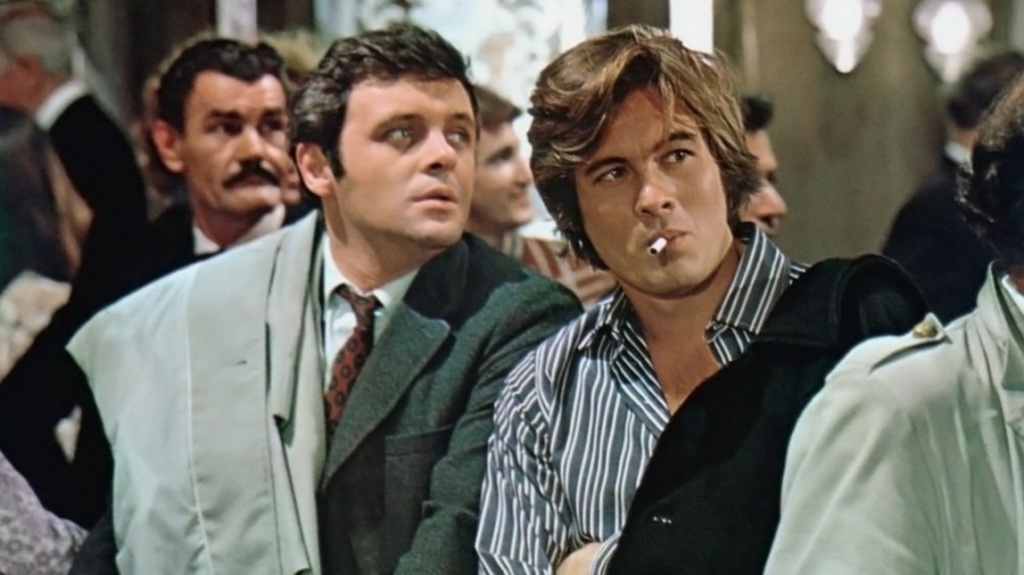This is normally the column where I recommend some international thrillers to get you through the weekend, but since we have an extra long holiday weekend coming up in the States, I thought I’d do something special, focusing on adaptations of le Carré novels, something of a passion of mine. In particular I want to hone in on a few of the lesser heralded selections. Really, this was just an excuse to recommend The Russia House: “Spying is waiting. Spying is worrying. Spying is being yourself but more so.”
If you love peace…and Sean Connery’s dissolute charms…

The Russia House
(1990, dir. Fred Schepisi)
I’ve been somewhat insistently telling people this is the most underrated spy movie ever made. But I’m going to admit, you have to share particular tastes to share that opinion. First, you’re need to be interested in the world of international publishing, because this centers around a glasnost era publishing fair held in Moscow, which eventually leads a rakish British bookman with a deep appreciation for the Russian people into a dangerous bit of espionage. Second, you need to be someone who values scenery, specifically location shoots, and even more specifically Lisbon and Moscow in the very late 1980s. There are other things to get into, but let me share a few more of the particulars that might entice you: an intricate screenplay by Tom Stoppard; British character actor James Fox turning in a stellar performance in support; Sean Connery playing a jazz-mad British publisher who drinks and curses his way through cleverly staged briefings; Michelle Pfeiffer doing a Russian accent and talking a lot about the world’s prospects for peace…and it sort of works. So I’m realizing now that I have too many thoughts on this film for a short squib to recommend it here, among others. So let’s make an agreement, that some number of you will watch it this weekend, and I’ll write much more on it in the near future, so we can re-convene.
If you want a slow-burn alternative to Sixties espionage…

The Looking Glass War
(1969, dir. Frank Pierson)
Le Carré says that he wrote The Looking Glass War in large part because British readers had taken to The Spy Who Came in From the Cold too romantically, missing most of his more acerbic criticism of British intelligence, so the follow-up has a more acute satirical bite, as does the film, which follows a rather absurd and dangerous scheme to send a recent émigré back into East Germany in pursuit of missile photographs. Christopher Jones plays the would-be defector, and a young Anthony Hopkins puts in an interesting performance as his handler. The film moves along at a pleasingly slow 1960s pace (Pierson, the director, is best known as the screenwriter behind Cool Hand Luke and later Dog Day Afternoon), and British intelligence does indeed come out of this one looking cynical, cold, cruel, and mostly incompetent.
If you ever wanted to go to theater camp but were too busy with espionage…

The Little Drummer Girl
(1984, dir. George Roy Hill)
A rather unexpected film to have been relegated to obscurity, even within the le Carré oeuvre, but that’s what you have here: a starry production, directed by George Roy Hill (Butch Cassidy and the Sundance Kid, The Sting), starring Diane Keaton in a fairly meaty role, alongside Klaus Kinski, and yet hardly anyone has seen the thing in decades (even after the promising, but ultimately pretty disappointing mini-series update a few years ago). The Little Drummer Girl is shrouded in the politics of the Middle East, but it’s also a story about acting and the craft’s enduring affinity with espionage. Diane Keaton is playing an American actress with anti-Zionist leanings, lured away from her work in London and ensnared in a highly complicated Mossad mission to flush out a PLO bomber. The shifting allegiances and motivations get pretty well muddied, but there’s still plenty to appreciate here.
If you like your spy films sweaty, unreliable, and full of innuendo…

The Tailor of Panama
(2001, dir. John Boorman)
Back in 2001, Pierce Brosnan was still Bond, so the fact that he was appearing in another, more cerebral spy thriller was the story that overwhelmed nearly everything else about The Tailor of Panama, but it’s an odd little movie with quite a few features of note, including the script, which was co-written by le Carré, and the slightly madcap atmosphere, which is at odds with other le Carré features, and feels closer to a Graham Greene story, like Our Man in Havana. Brosnan and Geoffrey Rush turn in some strange chemistry and there’s an unsettling dance scene you won’t soon forget, even if you might like to. Also, Harold Pinter appears in the cast. Oh, and it’s Daniel Radcliffe’s first role on screen. That’s quite a lot to pique your interest, but more than anything let’s say you might care to watch because it’s so finely honed in on one of le Carré’s perennial and most cherished themes: the power of a well-told lie (fiction).
If you’re honestly more in the mood for a classic British mystery…

A Murder of Quality
(1991, dir. Gavin Millar)
If you can get your hands on this one, it’s an interesting and uncanny experience, with the iconic Smiley put to work in the role of a classic British sleuth, dispatched from the world of espionage into a murder investigation at a British public school. Le Carré of course had many bones to pick with the British school system and the class divisions and corruption those schools propagate, so there’s a sort of restrained fury beneath this one. But on the surface it fits nicely within the British country estate sleuth tradition, except we’re watching it unfold along with literature’s most discerning spook (portrayed by Denholm Elliott).

















